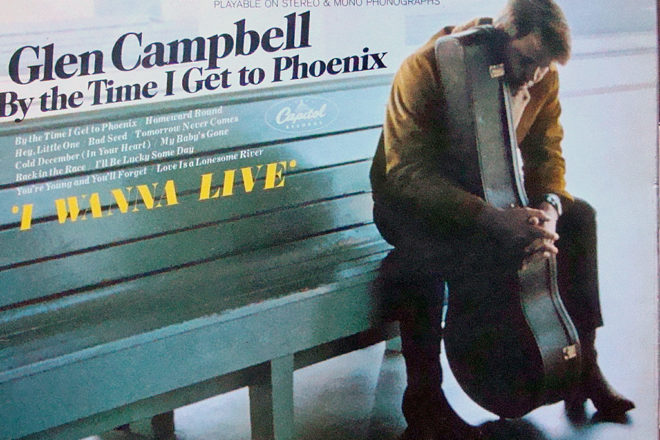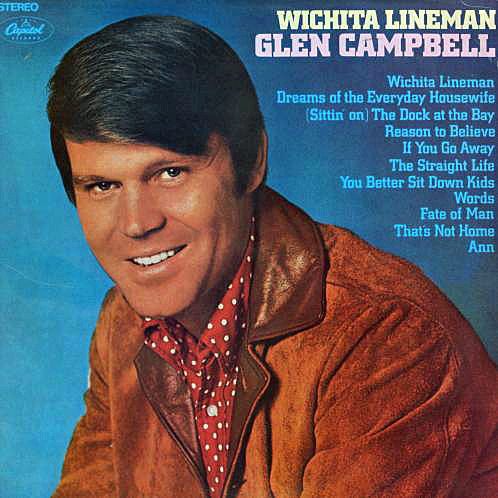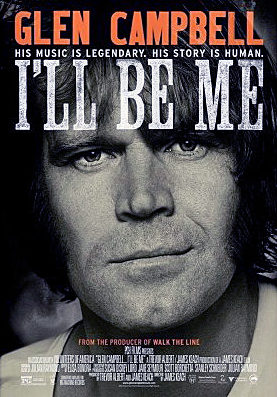American Musician Glen Campbell: A Retrospective
- Share
- Tweet
- Pin
- Share

Word of Glen Campbell’s death reached me the day after it happened, via NPR. As soon as I heard the news that he had died at age 81, I turned off the radio and pulled out my Glen Campbell records (right between J.J. Cale and Camper Van Beethoven), starting with the 1967 album Gentle On My Mind and it’s country-folk title tune written by John Hartford. Here was an example of Campbell tapping into the beautiful yearning melancholy that exemplified the 1960s.
Then on to his next album, I Wanna Live, also in 1967, which starts out with “By the Time I Get to Phoenix,” by Jimmy Webb, who, perhaps better than anyone, personified the yearning melancholy of the times. Campbell, with a natural hitch in his voice, interprets it in a way that makes you happy to be drenched in so much yearning melancholy.
And then the ultimate Campbell-Webb pairing, the haunting “Wichita Lineman” – “searching the sun for another overload.”
This is the very height of yearning melancholy, with high-strung violins giving it that hire-wire tension, and the big bass notes spelling it all out in one break (that’s Glen playing legendary Wrecking Crew bass player Carol Kaye’s six-string DanElectro bass). This is such an amazing, shimmering song. I play it again, and then a third and fourth time. Glen Campbell sounds more like an angel each time, his voice and the high strings meshing as one.
 “I need you more than want you, and I want you for all time.”
“I need you more than want you, and I want you for all time.”
I still don’t understand that line but it makes me melt each time I hear it.
Then on to the Webb-Campbell collaboration of 1969, “Galveston,” with a soldier presumably in Vietnam, thinking of the dark-eyed woman he’d left behind with the sea waves crashing, and then the line “Galveston, Oh Galveston, I am so afraid of dying…” and the big mind-bending bass notes that take the song out.
He was always able to fuse his country boy instincts with whatever was happening in music. He could, and did, play it all – country, folk, blues, rock. Campbell was as talented a guitarist as he was a vocalist.
And then I went to work and forgot about Glen Campbell and his death until the weekend, when I happened to flip through a streaming channel and found Glen Campbell: I’ll Be Me, a 2014 documentary about Glen’s farewell tour, which had been scheduled before he was diagnosed with Alzheimer’s.
We meet Glen Campbell at age 76, healthy in body and spirit, but already a victim of the disease that robs you of your memories. When we first see him, with a doctor, he cannot name the day, season or year. He cannot name the first president of the United States. Doesn’t need to know that stuff, he tells the doctor, because he can play “gitar” – it is always pronounced “gitar” by Glen Campbell.
Later, when another doctor is testing his motor skills and asks him to pretend he is playing the piano, Glen begins slicing and dicing the air with his fingers while telling the doctor, “I play gitar.” “I can tell,” the doctor quips.
What will blow your mind, and blew the minds of family members, doctors and audiences, is that once on stage during that final tour, Glen Campbell did not seem like an Alzheimer’s patient. Using a teleprompter, he sang his songs and played his guitar so well that it brought tears to the eyes of audience members, including many fellow musicians.
But this is the most interesting thing about this documentary – everyone knew the circumstances. With unprecedented openness, Glen Campbell’s family opened the process up to the filmmakers and the world by announcing that this famous Alzheimer’s victim and his mostly family band would go on his final tour in support of what was being described as his farewell album, Ghost On the Canvas.
It’s a beautiful document. One of my favorite moments is when Glen and his daughter Ashley perform “Dueling Banjos” from Deliverance.
His own doctor didn’t understand how Glen was able to function on stage and yet be declining in other cognitive areas. Once on stage – as long as he had the teleprompter – Glen Campbell was alive and well.
He recovers well at one show when the teleprompter dies, and there’s a funny moment during one song where the teleprompter included the instructions “Glen plays long guitar solo.” He repeats that to the audience, and then caught up with it by saying, “OK, I can do that,” and then bursts into the most amazing guitar solo you have heard from any 76-year-old man, Alzheimer’s or not. Things are not computing for him offstage, but once he is in the audience’s warm embrace – and the audiences are always there for him – he transforms into the masterful musician he has always been.
But it does not last. The insidious disease prevails and Glen Campbell’s last performances are marred by cognitive confusion.
The decline from the man we see early in the movie to the one at the end is steep. And he lived five more years after the filming.
 I wish the documentary had included even more of Campbell’s incredible musical history. For instance, they reference several times that he played with the Beach Boys. That’s him busting out on the Beach Boys “I Get Around” and he’s on the seminal Pet Sounds and was even tapped by Brian Wilson to fill in for him during the band’s 1965 tour when Wilson was recovering from a nervous breakdown. A small segment to prove that would have been nice – a photo, a recording – but there was nothing.
I wish the documentary had included even more of Campbell’s incredible musical history. For instance, they reference several times that he played with the Beach Boys. That’s him busting out on the Beach Boys “I Get Around” and he’s on the seminal Pet Sounds and was even tapped by Brian Wilson to fill in for him during the band’s 1965 tour when Wilson was recovering from a nervous breakdown. A small segment to prove that would have been nice – a photo, a recording – but there was nothing.
Or his history as a session musician and member of the Wrecking Crewing, a group of LA session musicians who played on many hits without credit (there’s a good documentary about them, too, wreckingcrewfilm.com). Presley, Sinatra, you name it.
That stinging psychedelic guitar on “Just Dropped In” by Kenny Rogers and the First Edition – Glen Campbell. His guitar is part of Phil Spector’s wall of sound on the Righteous Brothers hit “You’ve Lost That Lovin’ Feelin’” That’s his funky lead on The Monkees’ “Mary, Mary.” And that’s his bright acoustic lead on Merle Haggard’s “Mama Tried.”
Somewhere in my collection I have an early 1960s album of 12-string guitar that includes a couple tunes by a then-unknown Glen Campbell. People have forgotten that he was a formidable guitarist. Jimmy Webb once described him as “a secret weapon in the armory of Sixties record producers.”
If you are a Glen Campbell fan, see this movie. If you are a music fan, see this move. If you know someone with Alzheimer’s, see this movie.

